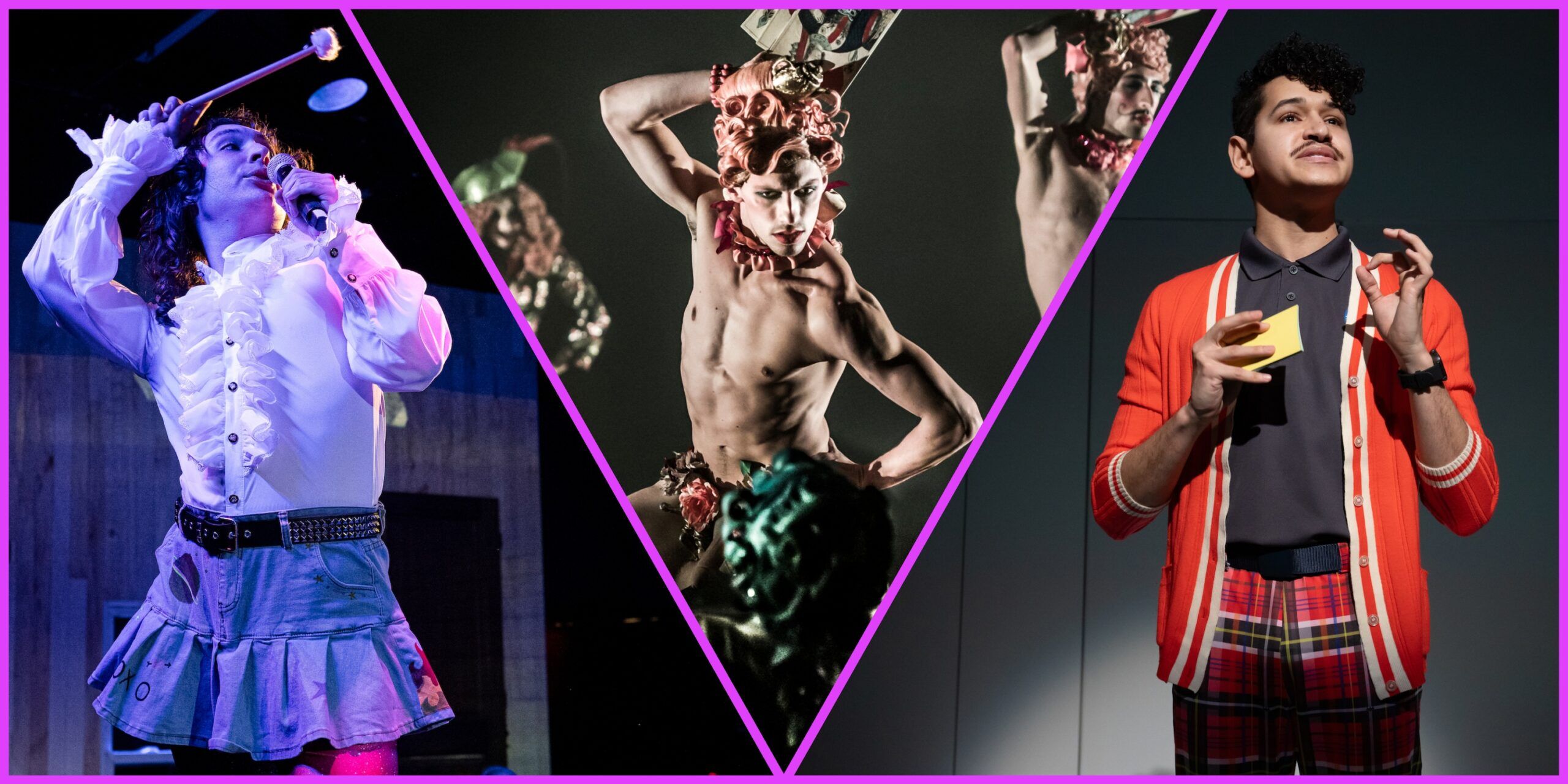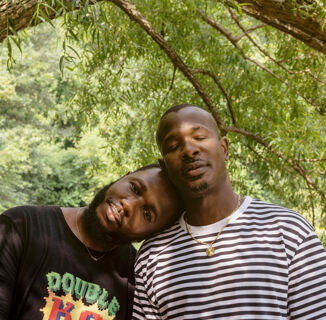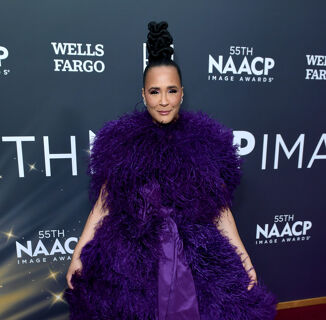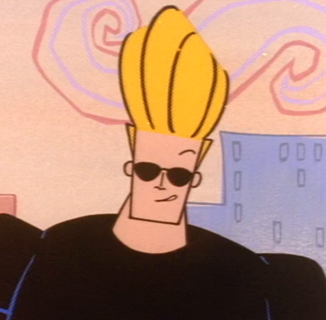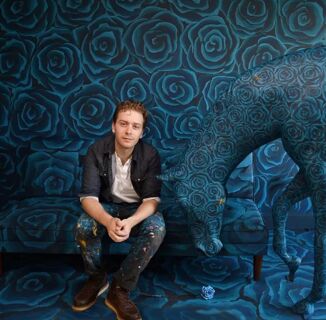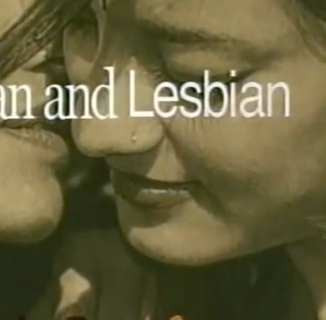Ghosts of bathhouses past. Demons made of childhood Halloween costumes. Scantily clad mermaids hanging from the ceiling. In New York City’s Off-Broadway theaters, queer imagination is running wild, where three new works imagine a world devoid of binaries, a society where the barriers to free expression come tumbling down.
In Bathhouse.pptx at the Flea, playwright Jesús I. Valles fantasizes about the future while their characters fantasize about the past. In Pipeline Theatre Company’s House of Telescopes, a chosen family of queer folks find the magic in themselves and their histories. And in Company XIV’s Queen of Hearts, a familiar fairy tale gets a sapphic twist.
The distant past comes to life: ‘House of Telescopes’
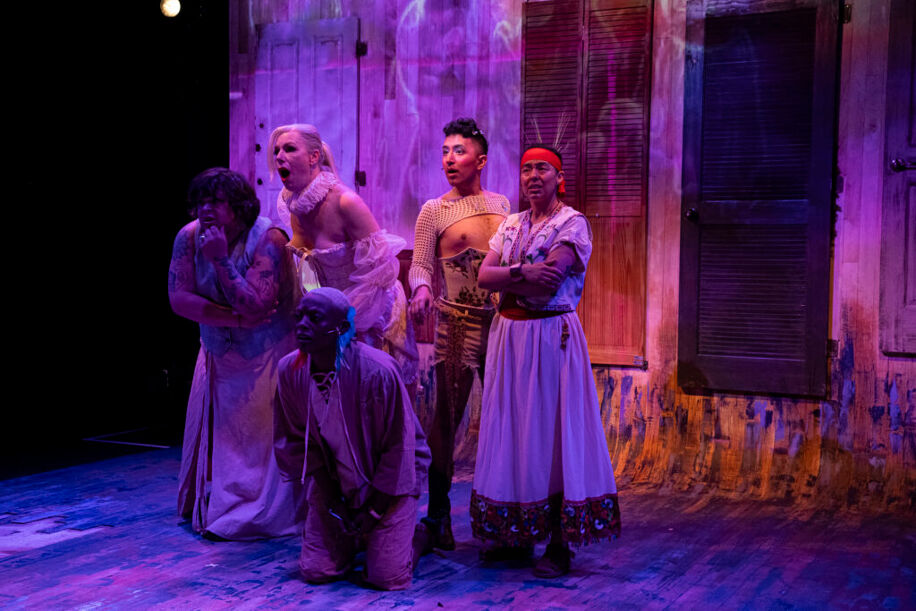
Though a run-down midwestern house in 2010 may not seem like the stuff of legend, House of Telescopes quickly proves there’s no reason it can’t be. At the center of the play is Fable, a trans woman at a crossroads. She’s living with her chosen family in Minnesota, but her strained relationship with her mother and her love for her siblings still anchors her to Colorado, all while she searches for a sense of purpose. Maybe she’ll write an opera? Maybe she’ll move to Germany? Maybe both.
Entertainment with an edge
Whether you’re into indie comics, groundbreaking music, or queer cinema, we’re here to keep you in the loop twice a week.
Playwright Kairos Looney explores a different side of queer fantasy: the mythos and magic of the distant past (and no, that’s not referring to 2010). Beyond being set over a decade ago, House of Telescopes sees its characters confronting their pasts. For Fable, that means desperate attempts at reconnecting with her ancestors: not necessarily her literal relatives by birth, but all the gender-nonconforming folks forgotten by history that came before her, who appear on stage as a chorus of singing ghosts.
It also means choosing to let go or hold on to her old self, the person she was before transitioning — which manifests as confronting a literal demon composed of childhood mementos, accidentally summoned to the material plane, and seeking a permanent physical form.
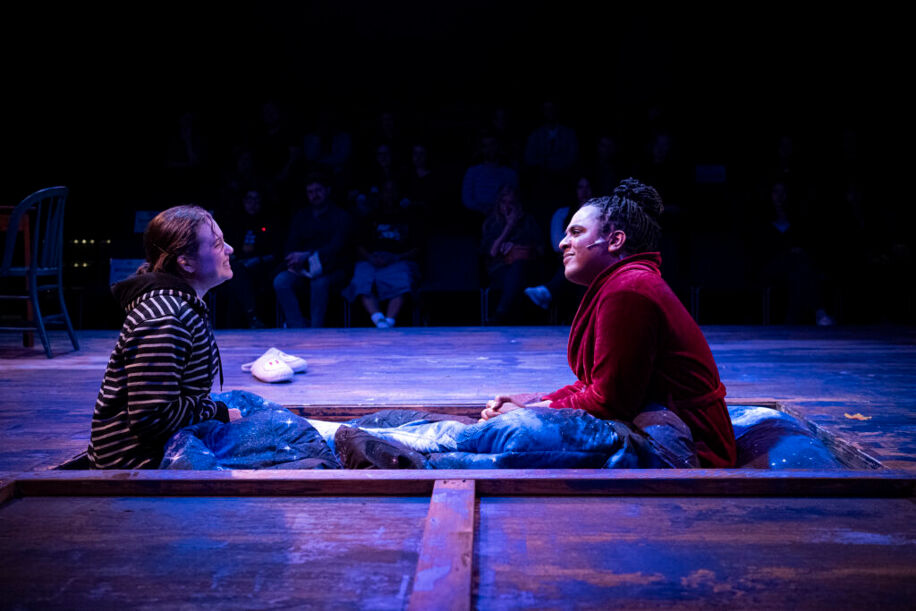
If it sounds like a lot, that’s because it is. House of Telescopes swings big: a large cast of 16 actors, a blend of realistic and supernatural elements, and a sweeping story across time and America. Looney’s writing is both poignant and meandering: a scene where Fable reflects on her status as a trans elder simply for reaching her 30s strikes a chord, as do most of the show’s reflections on trans identity, but the abundance of characters and plotlines means that inevitably, some will go underdeveloped.
The play feels overstuffed in its 100-minute runtime. The characters’ ambitions and internal struggles are too big to be contained, spilling across the stage and leaving loose ends everywhere.
House of Telescopes’ greatest successes are its original music by Aya Aziz — it’s a hauntingly beautiful score, befitting of the powerful ghosts who often sing it — and its performances — Joyah Dominique as Fable and LA Head as Sherman stand out, if only by having two of the most developed roles. Like its protagonist, House of Telescopes is committed to dreaming big and fighting its demons, even if it can’t always win.
House of Telescopes runs at A.R.T./New York Theatres through April 21.
Time travel, towel required: ‘Bathhouse.pptx’
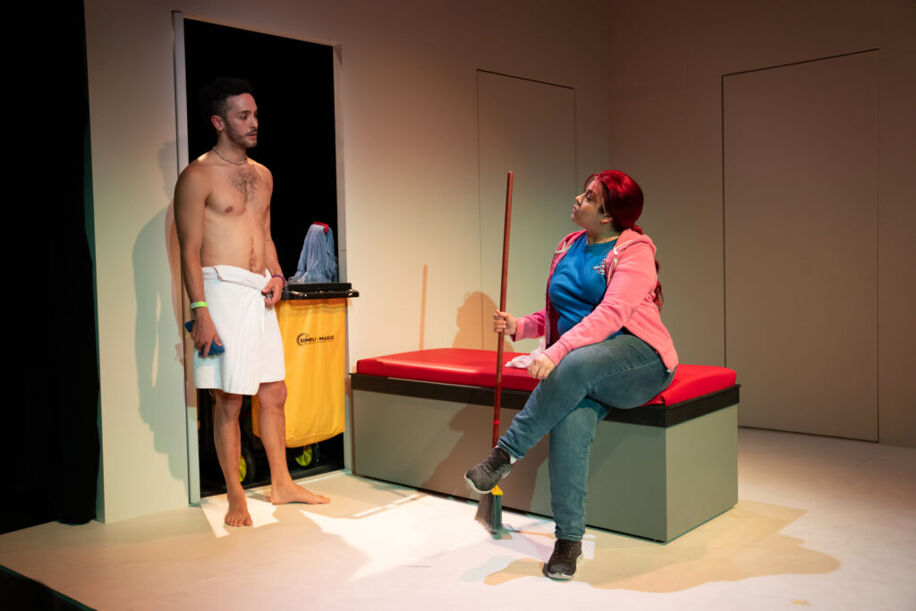
A play about gay bathhouses shouldn’t be set in a high school classroom. And yet, that’s where Bathhouse.pptx begins. Our protagonist, known only as the presenter, is a 10th grader giving a PowerPoint presentation on the history of gay bathhouses. (Rest assured, the actor, the wildly talented Sam Gonzalez, is an adult, and the play addresses the inherent discomfort between its main character and subject matter.)
But Bathouse.pptx is not simply a teenager giving a class presentation—that wouldn’t be much of a play, would it? Instead, the presenter reveals that his high school was once a bathhouse, and in the spirit of “showing not telling,” we’ll all be slipping back into the past.
For the presenter, though, the bathhouse is not a memory but a fantasy. He’s never been to a bathhouse himself: not only is he a teenager, but gay bathhouses no longer exist in his time, which is ten years into the future. Instead, he’s obsessed with their history, an aspect of queer culture he’s jealous he never got the chance to be a part of.
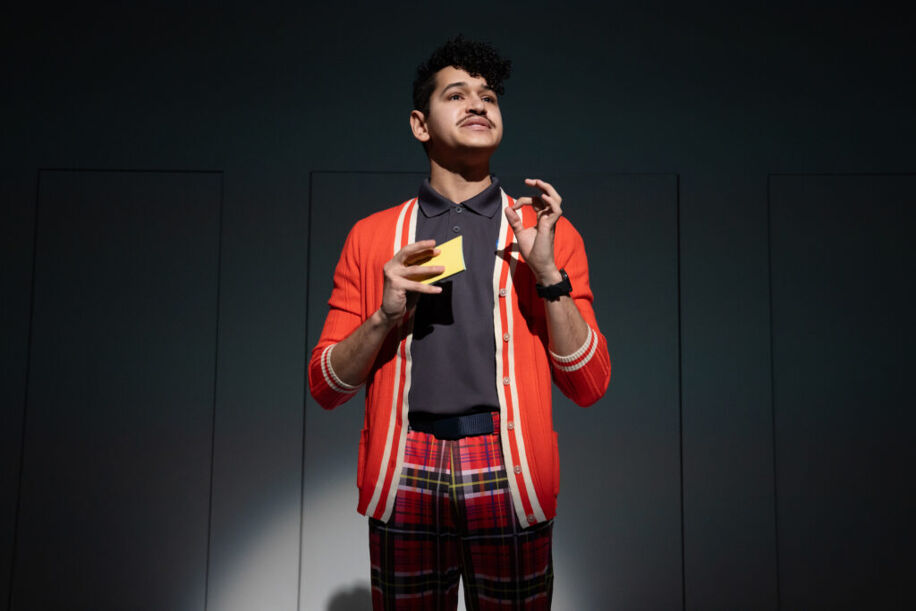
The characters the presenter watches in the past are, in turn, obsessed with their histories. One striking scene sees two men having an encounter in the bathhouse, and when dirty talk fails, they instead close their eyes, and each tells a story about a previous lover. Indulging in the past is an aphrodisiac, it seems, for everyone involved.
The play itself is a fantasy, too, for playwright Valles. Though it jumps forward, backward, and sideways through time, Bathouse.pptx is ultimately set in the future, and it’s not a bright one. The anti-queer sentiments of the modern day appear to have only gotten stronger, with elements of queer culture being squashed out of existence, relegated to the characters’ memories and imaginations. It feels almost apocalyptic — but feeling like the end of the world doesn’t mean things are really over, says Valles through their piercing, poetic dialogue.
“We felt the world ending back then, too,” one character, a lounge singer in the bathhouse, tells the presenter. “Just like it does right now. Doesn’t it always? Can’t you feel it?”
Bathhouse.pptx is nihilistic and optimistic, a contradiction that feels queer in itself — and a way, perhaps, to remember that no matter what gets lost in the shuffle as time marches on, there are always new expressions of queerness to discover.
Bathhouse.pptx runs at the Flea through May 5.
A devilish trip down the rabbit hole: ‘Queen of Hearts’
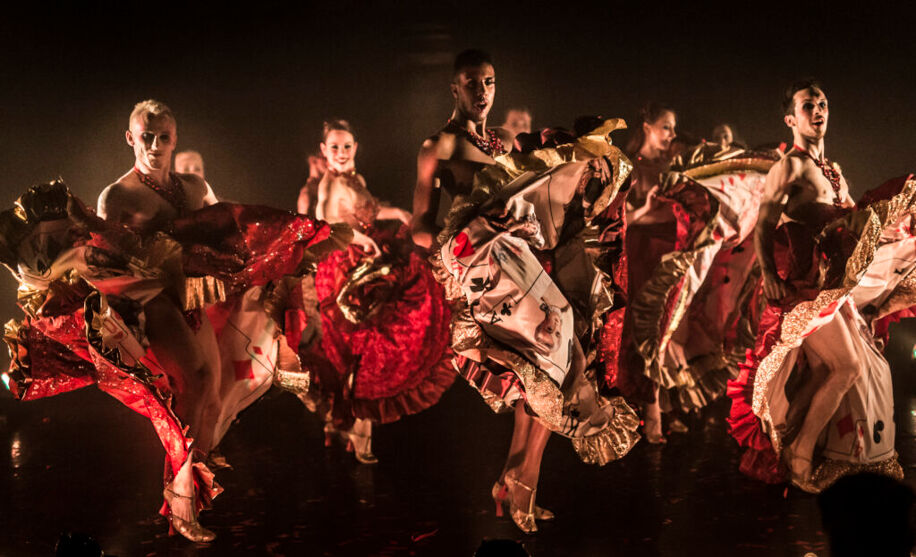
Lewis Caroll’s Alice’s Adventures in Wonderland has been told time and time again, including three Disney movies and two musicals (with varying degrees of success). Now, in Company XIV’s Queen of Hearts, Alice’s trip down the rabbit hole is a burlesque adventure, complete with a queer awakening for its aged-up main character.
Queen of Hearts is light on story and big on fun. It features no dialogue, just original music by rising pop songwriter LEXXE, who also plays Alice. Her songs let the multi-talented cast flex their vocal chops, including pop star Madison Rose as the titular Queen of Hearts, who — besides blowing the roof off the theater with her featured numbers — serves as Alice’s love interest.
That’s where Queen of Hearts breaks the mold of the Alice story. In this retelling, she’s a woman restrained by the views of Victorian society — until, of course, she slips through a looking glass and into a fantasy world. Like every show at Company XIV, Austin McCormick’s dance theater company located in Bushwick, Brooklyn, the talent on display is off the charts, from aerial performances to belly dancing to acrobatics and more. Zane Pihlstrom’s costume designs are similarly spectacular, ranging from the most extravagant gowns to the skimpiest thongs (still stoned for the gods, of course).
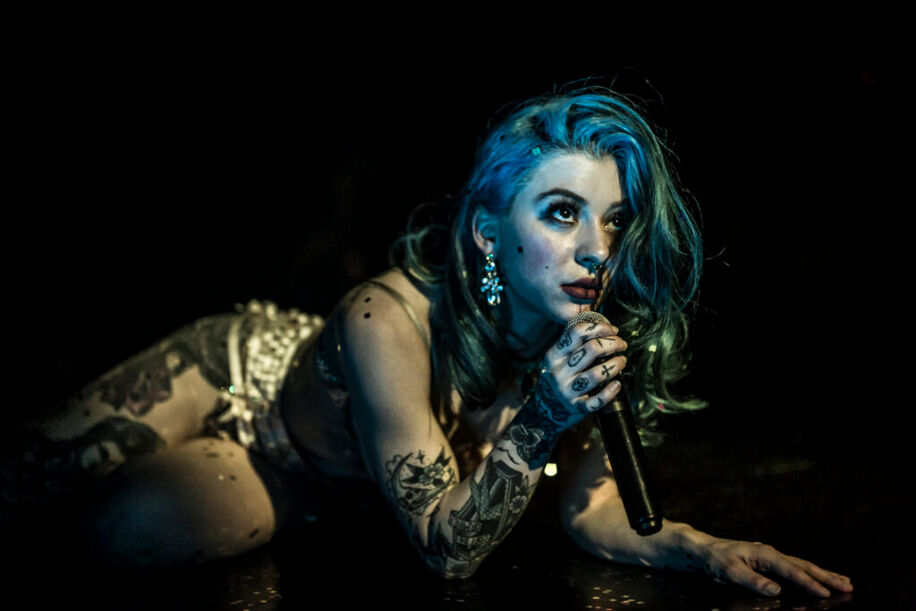
Like the audience, Alice can’t help being amazed by the glitz and scantily clad glamor, letting loose as she travels through Wonderland until she meets the Queen of Hearts and sparks fly. Their connection isn’t explored far beyond some intimate choreography, but its inclusion still speaks to the sapphic core of Queen of Hearts. Notably, the entire cast identifies as queer, a fact that shines through in their collective performance and speaks to what a queer utopia might look like through the lens of burlesque.
Queen of Hearts is fantasy in the purest sense of the word. It’s a feast for the eyes, the ears, and — if you sample one of the theater’s signature cocktails — the taste buds. Queen of Hearts isn’t aiming for too deep of a message beyond entertainment, but that’s a message in itself. It’s fantasy by way of escapism, something all too necessary in a cultural landscape that seems hellbent on keeping queer folks down.
Queen of Hearts runs at Théâtre XIV through August 25.
Featured image: (from left) “House of Telescopes,” photo by Marcus Middleton; “Queen of Hearts,” photo by Mark Shelby Perry; and “Bathhouse.pptx,” photo by Julieta Cervantes.
Related:
Dylan Mulvaney dreams of a trans ‘Legally Blonde’ musical
Dylan Mulvaney has her sights set on this Broadway role.
Help make sure LGBTQ+ stories are being told...
We can't rely on mainstream media to tell our stories. That's why we don't lock our articles behind a paywall. Will you support our mission with a contribution today?
Cancel anytime · Proudly LGBTQ+ owned and operated
Read More in Entertainment
The Latest on INTO
Subscribe to get a twice-weekly dose of queer news, updates, and insights from the INTO team.
in Your Inbox

